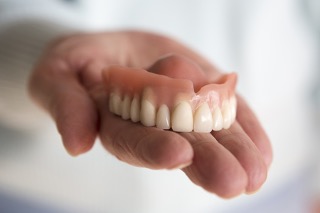Adults are regarded as seniors at the age of 60 years and above. The elderly experience increasing dental challenges as they age. What make matters worse is the tendency to experience several comorbidities; like hypertension, diabetes and a reduced immune system. As a result, practicing good home care in conjunction with regular visits to the dentist can make a big difference in proper health care for the elderly.
In this issue, we will discuss common dental aliments associated with the elderly along with ways to manage them.
Dry Mouth: This is caused by reduced saliva flow from the salivary glands under the tongue and on the side of the cheeks. Dry mouth is often caused by radiation damage of the glands when directed to the head and neck region as a side effect of cancer treatment. Also, a rear condition referred to as Sjogren’s syndrome causes dry mouth. Sjogren’s syndrome is an autoimmune disorder that affects moisture-producing glands. Ninety percent of people with Sjogren’s are women. It causes the eyes and mouth to dry out and can also lead to tooth decay, recurring oral thrush and a persistent dry cough. In our practice, the most common causes of dry mouth are related to the side effects of various medications. Some examples include:
- Antihistamines
- Antidepressants
- Antipsychotics
- Parkinson’s disease meds
- Alzheimer’s disease meds
- Some blood pressure and heart medications
- Seizure medications
Diminished Sense of Taste: While advancing age impairs the sense of taste, some diseases like Covid-19, diabetes, medications or mouth-rinses like Corsodyl and full dentures can also contribute to the perceived taste loss. I have found that full dentures are the most common cause due to their design. A full upper denture covers the major taste buds located on the roof of the mouth. You should discuss the management of these matters with a dentist.
Root Decay: This is caused by exposure of the root of the tooth to sweets, acids and bacteria. Have you heard the term referred to as “long in the tooth?” This is a phrase associated with seniors whose teeth have become longer due to gum disease. These exposed roots make the teeth susceptible to sensitivity and root cavities. The roots are more exposed because the underlying bone and gum levels recede and exposes more of the teeth. Roots do not have any enamel to protect them and are more prone to decay than the crown part of the tooth. Dentists manage this by applying fluoride gel to protect the root surface and recommending fluoride toothpaste. Ultimately, good brushing and flossing with regular dental visits will go a long way in reducing root decay.
Gum Disease and Tooth Loss: This is considered one of the most common diseases of seniors. It is caused by plaque and made worse by poor oral hygiene. Your habits like improper brushing, leaving food stuck between your teeth and tobacco use. Also, poor fitting crowns, dentures, poor diets, several diseases like cancer and diabetes are all commonly related factors that contribute to the severity of gum disease and teeth loss.
Gum disease is the most common cause of tooth loss and one of the most common diseases in the world. As seniors continue to advance in age, they are at greater risk for a number of dental health challenges. Good oral health and hygiene are especially important for seniors in preventing serious health and dental problems while improving their quality of life.
Dr. Kendal V. O. Major is Founder and CEO of Center for Specialized Dentistry which is a comprehensive family dental practice operating in Nassau and Freeport. He is the first Bahamian Specialist in gum diseases and dental implants since 1989. He also is a certified Fast braces provider. His practice is located at 89 Collins Avenue, Nassau at (242)325-5165 or [email protected]

Dentures in the elderly often don’t fit well. Patients get frustrated.

Limited dexterity in brushing causes severe build-up plaque build

Severe Periodontal disease- “long in the tooth”

See root cavities associated with aggressive tooth brushing and plaque buildup





